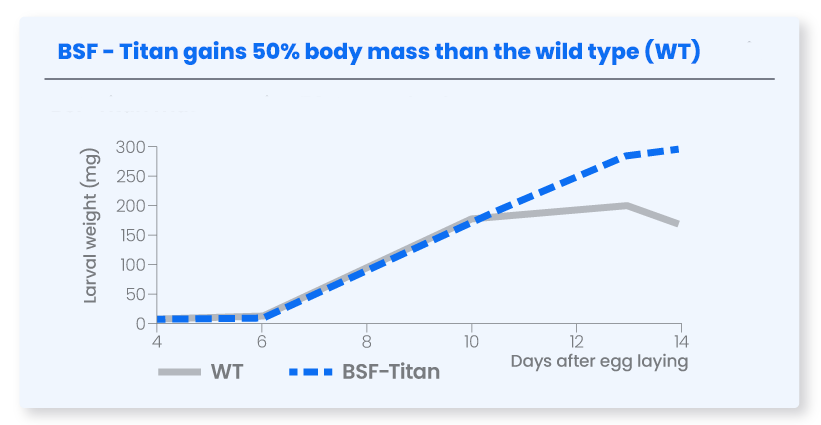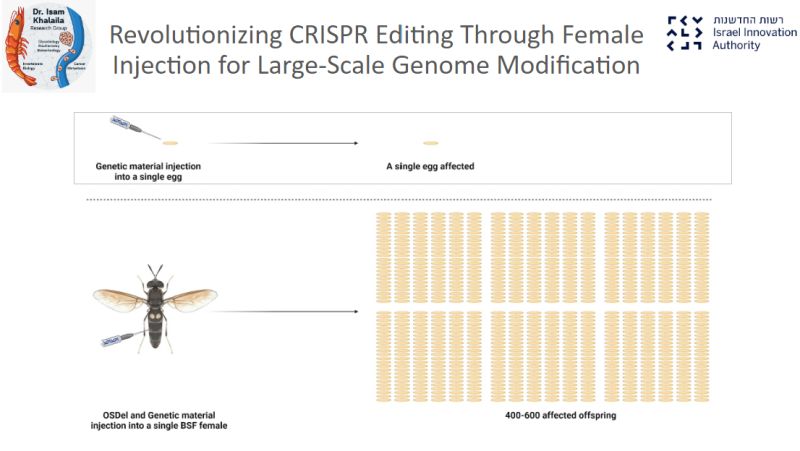In the dynamic realm of sustainable food production, a remarkable transformation is underway, led by a pioneering group of companies championing insect larvae as a revolutionary protein source. FreezeM has been recognized among these trailblazers, leveraging cutting-edge CRISPR technologies to elevate the efficiency and nutritional quality of black soldier fly (BSF) larvae.
Breaking Ground with CRISPR Technology
CRISPR, or Clustered Regularly Interspaced Short Palindromic Repeats, is a revolutionary gene-editing technology that has significantly impacted various fields, including agriculture and biotechnology. CRISPR allows scientists to precisely modify the DNA of organisms, including, of course, insects, by targeting specific genes.
Genetic Enhancement: CRISPR enables the targeted enhancement of specific traits in insects, aligning with the goals of insect-based animal feed production. This could involve modifying genes related to growth, reproduction, or resistance to environmental stressors.
Adaptation to Production Scales: By using CRISPR, we can potentially tailor the genetic makeup of insects to adapt seamlessly to diverse production setups and volumes, providing scalability to meet the global demand for sustainable animal feed.
Environmental Sustainability: CRISPR offers the opportunity to create insect lines that are more environmentally sustainable. This includes traits that enhance resource utilization, enable the upcycling of more waste streams using BSF, reduce ecological impact, and contribute to the overall efficiency of insect farming as a sustainable alternative in animal feed production.
Enhancing BSF Strains with Precision Gene Editing
Our commitment to pushing boundaries at FreezeM led us to harness the power of CRISPR–Cas9 technology, resulting in the enhancement of BSF strains. Deploying 400 guide RNAs targeting approximately 150 genes controlling metabolism, we’ve achieved strains with larger larvae, and prolonged larval periods. Notably, our gene-editing efforts include a focus on the sema-1a ortholog, a key regulator influencing molting. The result? Larvae that are a staggering 50% larger than their wild counterparts.
The versatility of our genetic engineering platform enables us to capitalize on the promising research path of reducing chitin in insect exoskeletons, a breakthrough that holds great promise for enhancing aquaculture feed efficiency and further solidifying our commitment to tailoring BSF strains for specific applications.
BSF Titan: 50% Bigger
FreezeM is developing advanced genetic lines of black soldier flies (BSF), leveraging CRISPR gene-editing for the optimization of growth, reproduction, and environmental resistance traits.
The innovation includes the BSF-Titan, a groundbreaking development in BSF genetic engineering. The BSF-Titan line phenotype is a 50% bigger larvae that maintains the same nutrition values (protein, oil ect.) as the wild type strain.

BSF-Titan utilizes CRISPR-Cas9 gene-editing methodologies to enhance BSF growth and protein content.
This line, in its final development stages, aims to enhance size and protein content, showcasing a 50% increase in larvae size and improved protein production yield. The BSF-Titan line could be obtained through traditional methods, complying with European regulatory non-GMO standards. BSF Titan marks a significant stride in sustainable and scalable insect farming for animal nutrition.
Ensuring safe and ethical genetic engineering practices
Achieving safe and ethical genetic engineering requires careful consideration of the underlying molecular mechanisms and the potential downstream effects of genetic modifications. It is crucial to ensure that any genetic modifications comply with established ethical guidelines and that the resulting organisms remain safe and viable for their intended applications. The work of our experienced scientific team at FreezeM acknowledges a comprehensive understanding of the genetic pathways involved, as well as the potential risks and benefits associated with genetic engineering.
Empowering the Future with Genetic Engineering
As we look forward to the future, enhanced genetic lines, like FreezeM’s first demonstration of BSF-Titan, are expected to open new horizons and applications for the BSF farming industry, and enable it to fulfill its potential.
FreezeM’s cooperation with the Khalaila lab at Ben-Gurion University of the Negev pushes the boundaries of CRISPR-Cas9 editing in Black Soldier Flies (BSF). Unlike the conventional method limited to editing one egg per injection, FreezeM, alongside Dr. Khalaila’s lab, pioneers a revolutionary approach enabling the simultaneous editing of hundreds of eggs in a single injection. This groundbreaking process involves a complex comprising CRISPR machinery and OSDel, a peptide facilitating delivery into developing female oocytes.

Targeting adult females allows editing of the DNA of all progenies, opening avenues for large-scale CRISPR editing with potential heritable changes across generations. Generously funded by the Israel Innovation Authority, this project underscores FreezeM’s commitment to advancing biotechnological innovations in BSF genetics. The genetic engineering platform promises superior BSF lines tailored to specific applications, amplifying production efficiency and overall performance.
The Larger Context and Future Prospects
These revolutionary methods align with the broader context of a burgeoning insect protein market, projected to reach $1.14 billion by 2027. Our contributions to the consortium, supported by the Israel Innovation Authority, exemplify collaborative efforts aimed at optimizing and scaling up BSF production. As the global demand for sustainable protein sources intensifies, FreezeM’s innovations represent a significant stride toward establishing insect larvae as a viable and eco-friendly alternative.
In conclusion, FreezeM’s pioneering work in utilizing CRISPR technologies to enhance insect protein for feed underscores the transformative potential of genetic engineering in sustainable agriculture. As we continue to lead the way in developing efficient and scalable solutions, the broader insect farming industry stands to benefit from advancements that could reshape the future of animal feed production.
